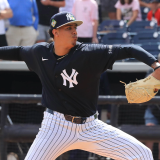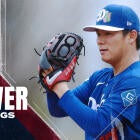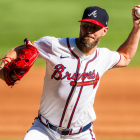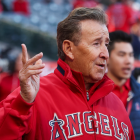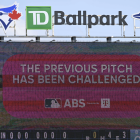Yankees vs. Guardians: Explaining obstruction call in ALCS Game 1 that led to Cleveland run
The Yankees held on for a Game 1 win, but there was a controversial moment in the late innings

NEW YORK -- The ALCS opened Monday night at Yankee Stadium and there was some controversy in the eighth inning. Well, it was only controversial if you're rooting for the New York Yankees, who eventually held on to beat the Cleveland Guardians in Game 1 (NY 5, CLE 2). New York leads the best-of-seven series 1-0.
The scene: Cleveland had Andrés Giménez at first base with one out in the eighth inning when Brayan Rocchio hit a ground ball to Anthony Rizzo at first base. Rizzo, who is playing with two broken fingers, dove for the ball and was unable to complete the play. The ball trickled into shallow right field and Giménez advanced all the way to third on the play.
Rocchio ran into pitcher Tim Hill, who was covering first base, as he rounded the bag. The collision knocked Rocchio off balance, and Hill tagged him out after the Yankees got the ball back to the infield. Here's the play:
Umps called interference on Yankees pitcher Tim Hill here and awarded Brayan Rocchio second base pic.twitter.com/gmGX5keBT0
— Talkin’ Baseball (@TalkinBaseball_) October 15, 2024
First base umpire Dan Iassogna called the play obstruction on Hill on the field, but manager Aaron Boone asked the umpires to get together to talk it out. They did, and the interference call stood. Rocchio was awarded second base on the play. The next batter, Steven Kwan, poked a single to left field to score a run. Rocchio was eventually stranded to end the inning.
"Originally (Iassogna) ruled not going to second base," Yankees manager Aaron Boone said after the game. "I wanted to make sure (the ball) didn't hit a runner. Just getting some clarification and obviously they huddled up and ended up awarding the base ... I was at least satisfied with how they processed it."
MLB rule 6.01(h)(1) covers obstruction:
If a play is being made on the obstructed runner, or if the batter-runner is obstructed before he touches first base, the ball is dead and all runners shall advance, without liability to be put out, to the bases they would have reached, in the umpire's judgment, if there had been no obstruction. The obstructed runner shall be awarded at least one base beyond the base he had last legally touched before the obstruction. Any preceding runners, forced to advance by the award of bases as the penalty for obstruction, shall advance without liability to be put out.
A fielder blocking the runner's path is textbook obstruction. It was clearly the correct call on the field. In Iassogna's judgment, Giménez would have reached third base and Rocchio would have reached second had he not been obstructed by Hill, so that's where the runners were placed. Maybe the placement of the runners is disputable, but it seems reasonable to me.
The Yankees and Guardians have a history of unusual obstruction and interference calls in the postseason. In Game 2 of the 1998 ALCS, Chuck Knoblauch infamously argued Travis Fryman ran out of the baseline and interfered with him on a bunt play, and stood there as Enrique Wilson scored what proved to be the game-winning run in the 12th inning. Here's the play:
Hill's obstruction on Rocchio was not nearly as costly (or, frankly, as memorable) as Knoblauch arguing Fryman interfered back in 1998, but it was certainly unusual. It's not often you see a pitcher standing in the runner's lane, preventing him from taking the next base. An unusual play, one that is only slightly controversial, and one that didn't impact the outcome.





